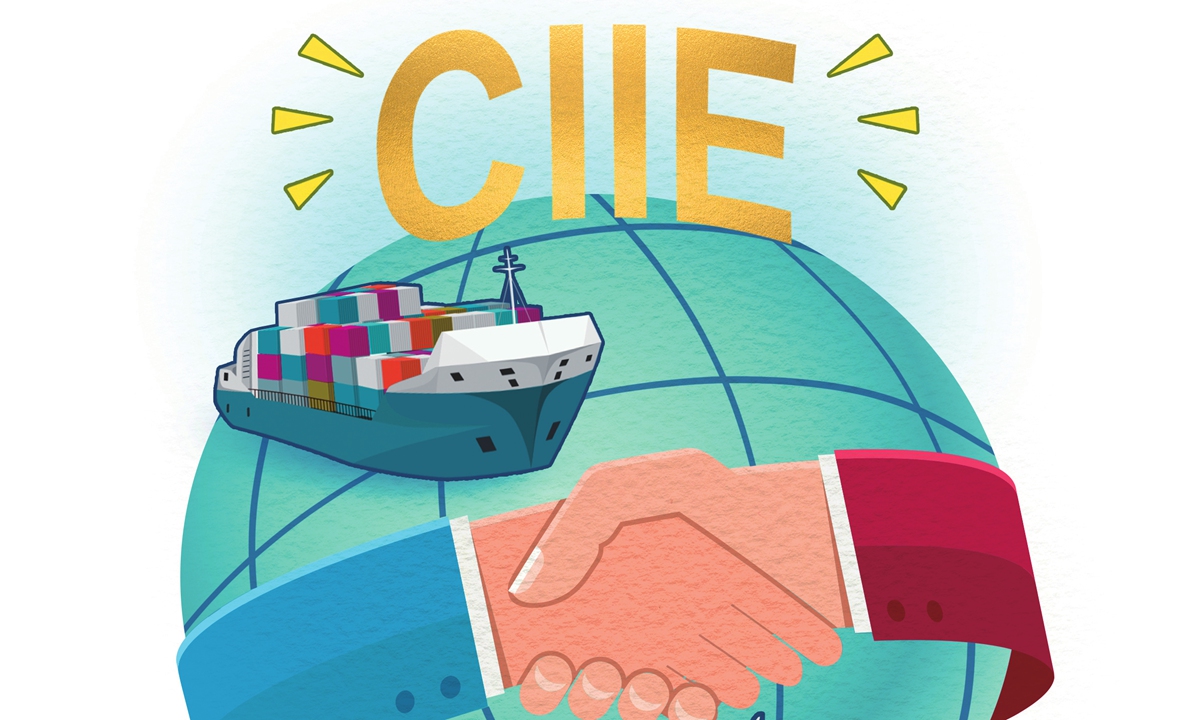
Illustration: Liu Rui/GT
Recently, my think tank and I myself participated in the preparations for the fifth China International Import Expo (CIIE), which will be held in November this year. From the preparation work, I could feel the hardships and difficulties of China for hosting such an event.
Coupled with the trade war the US launched against China and the COVID-19 pandemic, five years of the CIIE reflects the resilience and potential of China's development and its ability to shape the future of the world.
The CIIE came from the historical juncture of the transition the driving force of globalization from the West to the East. In the second half of the second decade of the 21st century, the US recovered from the financial crisis with an increasing strategic tendency of de-globalization and populism. In the later period of the Barack Obama administration, the Trans-Pacific Partnership was implemented in an attempt to establish a "small circle" to isolate China. After Donald Trump took office, the degree of de-globalization sentiment in the US deepened. In 2018, the US announced tariffs on imported goods from China, launching the largest-ever trade war against China in history.
China did not compete with the US for isolationism, but bucked the trend and hosted the first import expo. This was not only a show of strategic confidence in China's future development, but also to pull globalization back on the right track. It symbolized the rise of a new global power.
China's self-confidence is well founded. In the second decade of the 21st century, China gradually transformed from a "hitchhiker" to a leader in globalization. In 2013, China's total global trade in goods surpassed that of the US for the first time, becoming the world's largest trading country. In 2016, when the UK voted to leave the EU and Trump took office, China's foreign direct investment (FDI) exceeded $170 billion, turning into the net capital exporter. In 2020, China's FDI hit record high. In 2021, China remained the world's largest trading country, with its import and export shares accounting for 15.1 percent and 11.6 percent of those of the world respectively, becoming a veritable new leader and engine of economic globalization. The absolute values of all these landmark data indicate that China is beginning to lead a new wave of globalization, which some scholars call the "third wave in globalization."
Since the first CIIE was successfully held in 2018, China has joined the high-level regional cooperation agreement Regional Comprehensive Economic Partnership (RCEP), applied to take part in Comprehensive and Progressive Agreement for Trans-Pacific Partnership (CPTPP) and the Digital Economy Partnership Agreement (DEPA), and used its own actions to fulfill the promise of globalization under high-quality development.
At present, China is actively raising the level of imports, especially in the service industry. The global significance of the CIIE is becoming clearer.
First, the expo reflects the new process of reshaping world trade and economic patterns. The Great Exhibition of 1851 was held in London, reflecting the establishment of Britain as a global economic and trade leader since the Industrial Revolution. In 1939, the first New York World Fair was held, heralding the arrival of American economic supremacy. The impressive economic and trade data of the 2018 CIIE announced another change in the world economic landscape in the midst of the profound changes unseen in a century.
Second, the expo signals a new beginning for China to lead a new wave of globalization. The globalization led by China is not the traditional mercantilism of selling without buying, let alone ignoring the development of other countries and regions. As a newly emerging global power, China hopes to continue to hold the CIIE to show that China is willing to share China's dividends with the people of the world, and to pursue a new and better life with all countries in the world with the philosophical logic that "people get rich first and then push for common prosperity."
Third, the expo is a new window through which different civilizations can learn from each other in this new era. The companies and people that participate in the expo do not only aim at doing businesses, but also deliver a spirit of struggling and hard-working at a time when pessimistic sentiments are prevailing and the global economy is experiencing a downward trend. As long as trade and exchanges continue, and as long as people are willing to communicate, civilization evolution and cultural appreciation will continue.
The author is executive dean of Chongyang Institute for Financial Studies, Renmin University of China, executive director and a distinguished professor of China-US People-to-People Exchange Research Center. opinion@globaltimes.com.cn




